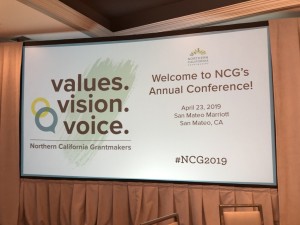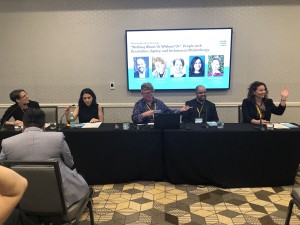
A banner welcoming attendees to the NCG Conference
The Northern California Grantmakers (NCG) hosted its Annual Conference on April 23, and the WITH Foundation was in attendance. Our Executive Director, Ryan Easterly also took part in a spirited breakout session on the topic of Disabilities, Equity, and Inclusion in Philanthropy.
The gathering was an invaluable opportunity to connect with other funders and to learn from them. The mood of the conference was upbeat—even celebratory—with a sense of urgency, given the complex social issues society faces every day.
What is the Northern California Grantmakers?
NCG is an association of foundations, corporate contributions programs and other public and private grantmakers. There are 200 member organizations (including WITH), representing $3 billion of funding in Northern California. NCG members bring deep expertise across a wide range of issues including health, education, arts, immigration, workforce and the environment. To learn more about NCG, please see: www.ncg.org
Key Takeaways from the daylong conference include:
The Great Debate
Two dynamic teams vigorously argued for and against the question: Does philanthropy have a leadership role to play in social change movements?
Peter Long of Blue Shield of California Foundation and Fatima Angeles of the California Wellness Foundation were on TEAM YES. Some memorable quotes from TEAM YES:
- “The question is not do we have a role, but what role should philanthropy play?”
- “Philanthropy has the power to capture the attention of people who may be inclined to tune out social change movements.”
Cedric Brown of the Kapor Center and Carly Hare of Change Philanthropy
- “Organizational philanthropy only has the obligation to support, advise, and connect. Is that a leadership role? I say NO!”
- Have we done the extensive culture shift needed within our philanthropic organizations to allow people of color to thrive? Philanthropy can’t lead social change, but must always work alongside social change movements.
While the “NO” group won, it was close decision, and the debate regarding the role of philanthropy in social change will continue.
Break Out Sessions
There were 18 breakout sessions throughout the day. All the sessions provided useful information and perspectives on “Values. Vision. And Voice” within the philanthropic sector. As mentioned earlier, WITH was pleased to participate in a session entitled “Nothing About Us Without Us”: People with Disabilities, Equity, and Inclusion in Philanthropy

5 people, one man and four women with a variety of skin and hair colors, sit at a table facing an audience.
Lisa Galloway moderated the session. She is the Grants Program Associate at Ability Central Philanthropy, which supports technology and programs that serve the communication needs of Californians with disabilities. Panel Members were:
- Noorain Khan, Director, President’s Office at the Ford Foundation. Ford Foundation supports work that reduces poverty and injustice, strengthens democratic values, promotes international cooperation, and advances human achievement.
- Rachel Humphrey, Senior Program Director at Justice Funders. Justice Funders guides and supports philanthropic institutions in aligning practices with social justice values.
- Sheraden Nicholau, Bay Area Regional Manager at the California State Council on Developmental Disabilities. The Council uses advocacy, capacity-building and systemic change to ensure that Californians with intellectual and developmental disabilities (I/DD) and their families have increased supports and resources. Learn more about Sheraden here.
- Ryan Easterly, WITH’s Executive Director, also served on the panel.
The panel’s discussion centered around the following premise:
1 in 4 U.S. adults–61 million Americans–have a disability that impacts major life activities; therefore, people with disabilities are the largest “minority” population yet are often left out of diversity, equity, and inclusion efforts (DEI). The experience of disability occurs within all communities whether based on gender, gender expression, race, ethnicity, national origin, sexual orientation, family status, religious affiliation, class and/or veteran status.
Below are some of the discussion points, and how members of the panel weighed in:
What is important to understand about this work, what steps can funders take?
Ryan Easterly, WITH Foundation
“1/4 adults in the U.S. have a disability. If you care about equity and inclusion, you have to include disability or you’re not actually doing the work.”
“Talk to people with disabilities. Reach out to your local disability organizations they can help.”
Ryan also shared the importance of doing DEI work not as tokenism or to “check that box” but as work that connects individuals and communities to power and influence.
Noorain Khan, Ford Foundation
“This is urgent work. Survey grantees, go to inclusive spaces, conferences and understand the dark history of disability funding. Don’t be spooked by discord within the community”
“Compensate individuals/advocates for their sharing and information, go to their spaces.”
Noorain also pointed out the importance of using the power and influence of philanthropy in service of the communities we are serving.
Rachel Humphrey, Justice Funders
“Re-think access when convening with people with disabilities.”
Sheraden Nicolau, California State Council on Developmental Disabilities
“Just get started with disability funding. It’s not about getting ready for it. You *are* already ready.”
What have you learned about the disability community through this work?
“Even thought I was born with a disability and acquired another, I still learn about other disabilities, other experiences.”
Ryan Easterly
“Working in DEI helped make all of our work better.”
Noorain Khan
“The disability community is creative, joyful and determined. This makes me more aware and more caring for others.”
Rachel Humphrey
During the session the following video and resources were shared:
Disability Justice & Philanthropy: A Message To Funders video
Resources
- Disability and Philanthropy Forum, an online forum and a community of foundations dedicated to peer learning and funding for disability inclusion. The Forum offers informal resources and tools to support peer learning, as well as resources to support donor operations and grantmaking. To learn more, visit: www.disabilityinclusion.net/
- The Presidents’ Council on Disability Inclusion in Philanthropy is comprised of 15 foundations who are committed to disability inclusion as part of improving diversity, equity, and inclusion within philanthropy. To learn more, visit: www.disabilityinclusion.net/presidents-council
- Exponent Philanthropy Disability Funders Peer Circle, a peer learning group for philanthropic organizations with few or no staff. To learn more, visit their website.
Thank you to NCG for a great conference! Special Thanks to Alice Horn and Phuong Quach (of NCG) and Shelley Kim (of Girl Friday Events) for their assistance with and support of the Nothing About Us Without Us”: People with Disabilities, Equity, and Inclusion in Philanthropy session.
If you are a funder and have questions about including disability in your grant portfolio and/or including disability into DEI efforts, please email: FunderEdu@withfoundation.org and WITH would be happy to talk with you!
